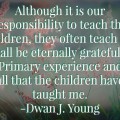This article was previously published on Latterdaysaintwoman.com
It was the worst lesson I’d ever taught–not the lesson itself, but the class experience in general. None of the tricks I’d learned over the years to keep children under control were working. My little three-year-olds were running around, hitting, and kicking. Then one grabbed the scissors I was using in a demonstration and started trying to cut hair.
At that point, I simply opened the classroom door and called into the hallway, “Help!” A member of the Primary presidency came running and removed the two ringleaders while I regained control. After class, I sank into a chair and wondered where I had gone wrong. I’d had terrible classes before, but this was the worst.
 Later that week I met with the Primary president to ask what to do. She assured me that life was not ruined because I’d lost control. Together we went over the class and identified the problem. I saw that if I had realized how bad things were getting, I could have stopped it. However, I’d gotten so busy teaching a lesson that I had stopped teaching students. I had not even noticed how excited the children were becoming until they finally exploded. I had over-excited them with too many visual aids, hands-on activities, and stimulation.
Later that week I met with the Primary president to ask what to do. She assured me that life was not ruined because I’d lost control. Together we went over the class and identified the problem. I saw that if I had realized how bad things were getting, I could have stopped it. However, I’d gotten so busy teaching a lesson that I had stopped teaching students. I had not even noticed how excited the children were becoming until they finally exploded. I had over-excited them with too many visual aids, hands-on activities, and stimulation.
I had several choices now. I could resign immediately, since it was clear I was the world’s worst teacher. Or…I could go back into that classroom and start over. I started over. It wasn’t the first time I had started over and it wouldn’t be the last. Even after more than 20 years of teaching, I still have days when my class is so bad that I just have to start over next week.
It’s perfectly normal to go home and be upset with yourself, to get angry, or even to cry. You may need to call a friend and collect some sympathy and wisdom. However, don’t stay in that stage too long or you may never get back out. It is self-defeating to keep reliving the terrible experience and telling yourself how awful you are. It’s better to move on to the next step.
Review the class objectively, leaving your emotions packed away in your teaching supplies for the moment. If you can’t do this alone, ask someone to help you. Remember to choose someone who is kind and supportive. You won’t benefit from hearing that yes, you were an awful teacher and ought to resign right now. You want someone who will help you figure out what went wrong and what you are going to do about it. You want someone who will help you feel good about yourself again.
 Don’t write down things that won’t help you. “The lesson I prepared was stupid.” “I’m a terrible storyteller.” These types of explanations make you feel like a bad teacher, and that is the attitude you are trying to avoid. My list for that day included these observations: “I over-stimulated the children with too many activities.” “I neglected to notice at what point they became too excited.” “I allowed the two least well-behaved children to sit together.” These were all things I could change.
Don’t write down things that won’t help you. “The lesson I prepared was stupid.” “I’m a terrible storyteller.” These types of explanations make you feel like a bad teacher, and that is the attitude you are trying to avoid. My list for that day included these observations: “I over-stimulated the children with too many activities.” “I neglected to notice at what point they became too excited.” “I allowed the two least well-behaved children to sit together.” These were all things I could change.
By identifying specific problems in the lesson preparation and presentation, I was able to decide what needed to change. My very first Primary class had included two hearing impaired students and one visually challenged student and I had developed the habit of using all the senses in presenting lessons.
I now had to learn to do this selectively, and to pace my lessons. Seating arrangements, pacing, and monitoring of moods became my first goals. Having specific skills to work on allowed me to come to class the next week with a plan and to feel confident. I understood that I could not fix all the problems the first week, but I had a plan and could make progress.

To read more of Terrie’s articles, click the picture.
It is very important to forgive yourself when things go completely wrong. Prayer is essential in this process. It’s also important to realize that no one at all is a perfect teacher. Some days are good and some are bad. Sometimes the problems are not even your fault. I’ve had days when students were excited about something outside of Primary, when leaders interrupted over and over and when the classroom temperature was too hot or cold. There are just days like that. Whether the bad day is my fault or not, I have learned to see each class as a learning experience, an opportunity to evaluate my skills and to grow.
And if that doesn’t work: If all else fails…laugh!
About Terrie Lynn Bittner
The late Terrie Lynn Bittner—beloved wife, mother, grandmother, and friend—was the author of two homeschooling books and numerous articles, including several that appeared in Latter-day Saint magazines. She became a member of the Church at the age of 17 and began sharing her faith online in 1992.






